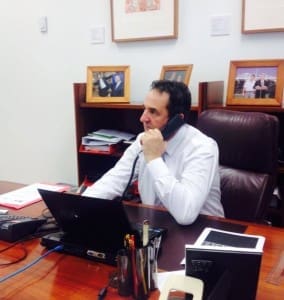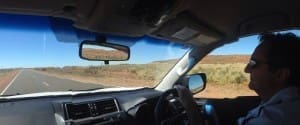The Meat & Livestock Australia restructure announced earlier this week will not be considered in the final report Senators make to Government from the recent inquiry into grassfed beef industry levies and structures, inquiry chair Glenn Sterle told Beef Central this week.
The Senate Rural and Regional Affairs and Transport (RRAT) References Committee is set to table its final report and recommendations for the Government to consider on September 23.
When contacted by Beef Central this week to ask if the committee’s final report and recommendations will take MLA’s internal restructure announced on Monday into account, Senator Sterle said that was unlikely.
The Senator said his draft report and recommendations, which could not be disclosed until the final report is tabled in one month’s time, had been written by the time MLA’s review outcome was announced on Monday and had been distributed to other Senators for their perusal and input on Wednesday.
MLA unveiled sweeping changes on Monday to its research, development and extension operations, in response to criticisms leveled during the recent Senate inquiry and last year’s independent systems review about its approach to transparency and accountability.
The timing of the internal review while the Senate inquiry was still underway raised at least some questions as to whether the move was an attempt by MLA to head off the risk of Senators recommending major changes to its operations by demonstrating that what needed to be mended had already been mended.
That suggestion was ardently rejected by MLA managing director Richard Norton in comments to Beef Central last month, when he explained that the timing of the review was motivated only by a desire to act on an identified problem as quickly as possible.
“The board felt it could not sit around and wait for what recommendations the senate inquiry might come up with, before beginning this process – or whether or not the minister takes them up,” he said.
Anticipation builds around report release
Few documents have created as much anticipation in Australian cattle industry circles in recent times as next month’s report Senate inquiry report.
The report will contain recommendations by Senators to Government based on their interpretation of evidence provided in close to 200 written submissions and seven days of public hearings held around Australia.
The terms of reference require the Senators to make recommendations to Government on issues such as how levies are collected and used; the opportunities levy payers have to influence the amount of levy they pay and how it is invested; how industry governance, consultation and reporting frameworks should be structured; and what changes should be made to maximise the benefits to grassfed cattle producers from levy-funded marketing and R&D efforts.
Former WA truckie holds the wheel
A former owner-operator truckie from WA has suddenly become a person of critical interest and importance to Australia’s $10 billion a year beef cattle industry.
Labor Senator for WA Glenn Sterle steered furniture trucks and road trains across all points of the west and occasionally into the Northern Territory and over the Nullabor in the 1970s and 80s before he became a Transport Workers Union organiser in 1990.
As a Labor Senator he is now the chair of the Senate Rural and Regional Affairs and Transport Committee and in that capacity his hands are firmly on the steering wheel that will decide which direction recommendations to Government take.
It is of course worth noting that the Government has no obligation to act on the recommendations the RRAT committee provides. However that is balanced against the fact that this inquiry was instigated by the very Minister who will decide how the report is acted upon, agriculture minister Barnaby Joyce. It would seem unlikely that having believed the case for change was strong enough to initiate an inquiry, the Minister would then leave the final report to sit on a shelf to gather dust without acting on at least some of the recommendations it produces.
The six-member RRAT references committee, which will ultimately sign off on the final report and recommendations, comprises three Labor Senators, all from WA (The chair Senator Sterle and Senators Joe Bullock and Sue Lines); one Liberal Senator (Bill Heffernan from NSW), one Nationals Senator (John Williams from NSW) and one Greens Senator (Peter Whish-Wilson from Tasmania).
Those Senators now have until the report’s tabling date on September 23 to review the draft recommendations and to make additional comments or to lodge dissenting reports.
Senator Sterle was driving through the Pilbara on his way to Port Hedland earlier this week when Beef Central caught him in a rare patch of remote mobile phone coverage.
“the recommendations will create a fair bit of conversation..”
The Senator said he could not comment on what his recommendations are until the final report is tabled on September 23, but disclosed that the report will contain a number of recommendations “that I believe will create a fair bit of conversation”.
“Once it is tabled then I can come out and explain,” he said. “What I can tell you is it is amazing how popular I have become with certain peak industry councils who can’t wait to get to me.”
Senator Sterle said there had been very few points of contention between the government senators, opposition senators and the Greens senators during the inquiry – apart from the Greens’ clear opposition to the live export trade – and he did not anticipate significant differences of opinion over the draft recommendations.
“I can say on my draft I am not of the opinion of changing anything, I am standing by what I have written, and I hope the rest of the committee back me and support me,” he said.
Report will not take MLA restructure into account
The Senator said he had only learned of the MLA restructure announcement on ABC Radio while driving in regional WA on Monday and was still not aware of the full details.
When asked if MLA’s restructure outcomes would influence the Senators’ final report, he said it was unlikely.
“MLA have been questioned on their transparency and their accountability for a number of years,” he said. “I don’t want to take away from anything the new CEO is doing, that is a matter for MLA, but it will not affect the report or my recommendations in the report.
“I wish MLA all the best but I am not taking into account their latest announcement.”
Report should not be rushed
Senator Sterle said the RRAT committee had made an effort to hold as many public hearings and to talk to as many people as possible and was determined to take the time required to produce an effective report for the industry.
This was also the reason for the final reporting date being pushed back from July until September 23, he said.
“We didn’t want to rush it. What I discussed with the rest of the committee and I had the full support of the committee across the parties, was that this was too important to rush.
“I am very mindful of the 2002 Rural and Regional Affairs and Transport Committee report on MLA structure, to cut a long story short the Government shelved it and nothing was done.
“That is the last thing I want with this one.”





Any reading of the submissions to the Senate Inquiry unequivocally confirms that there is overwhelming cattle producer support for the immediate dissolution of MLA on the grounds that it has failed totally.The most effective way to fairly test this proposition is to hold a plebiscite amongst cattle producers to determine whether they want to pay the cattle transaction levy.In what is supposed to be a free democracy this doesn’t sound like rocket science yet our political leaders seem to be having trouble coming to grips with the concept of no taxation without representation.The current industry structure has handed control of prices and quality to five large corporations who have shown time and time again that they will resist anything that might lead to higher cattle prices.Australian cattle producers only receive a miserable 26.5% of the retail beef dollar as compared to 49% in the US.MSA has been diluted and “optimised” to the point of being almost useless and the big 5 continue to cheat consumers by selling beef from old cattle alongside Y or YG.At current prices cattle producers are paying people to eat beef yet MLA and their supporters at the Cattle Council of Australia seem unworried and oblivious to this fact.They have no ideas,no strategy and no support.Worse still,the current cattle prices don’t tell the whole story as they do not reflect the array of unfair discounts the big 5 levy against cattle producers.The senators must consider this dire situation very carefully and soberly.Much is at stake and rearranging the deck chairs to give MLA and the CCA “another chance” will result in the bankruptcy of the cattle industry.